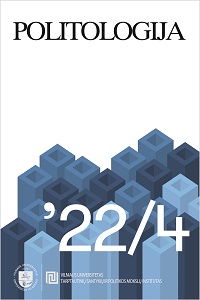Lietuvos gyventojų polinkis kliautis sąmokslo teorijomis
Reliance on Conspiracy Theories Among Lithuanian Population
Author(s): Arvydas Grišinas, Ainius Lašas, Ignas KalpokasSubject(s): Media studies, Political Sciences, Political psychology, Politics and communication, Social psychology and group interaction
Published by: Vilniaus Universiteto Leidykla
Keywords: conspiracy theories; socioeconomic exclusion; determinism; esoteric thinking;
Summary/Abstract: This article analyses the statistical validity of popular explanations for peoples’s tendency to rely on conspiracy theories in Lithuanian public discourse. The paper discovers that out of four most popular explanations, belief in paranormal phenomena and determinist thinking have the strongest correlation. The evaluation of one’s own perceived financial wellbeing also proves significance. Meanwhile, education, political knowledge and actual income level either correlate with tendency to rely on conspiratorial thinking sporadically or does not correlate at all. The study is based on a representative survey, conducted in Lithuania, in late 2021, and seeks to delineate the initial outlines for further research on the case of Lithuania, which has been only scarcely explored.
Journal: Politologija
- Issue Year: 2022
- Issue No: 4 (108)
- Page Range: 42-84
- Page Count: 43
- Language: Lithuanian

